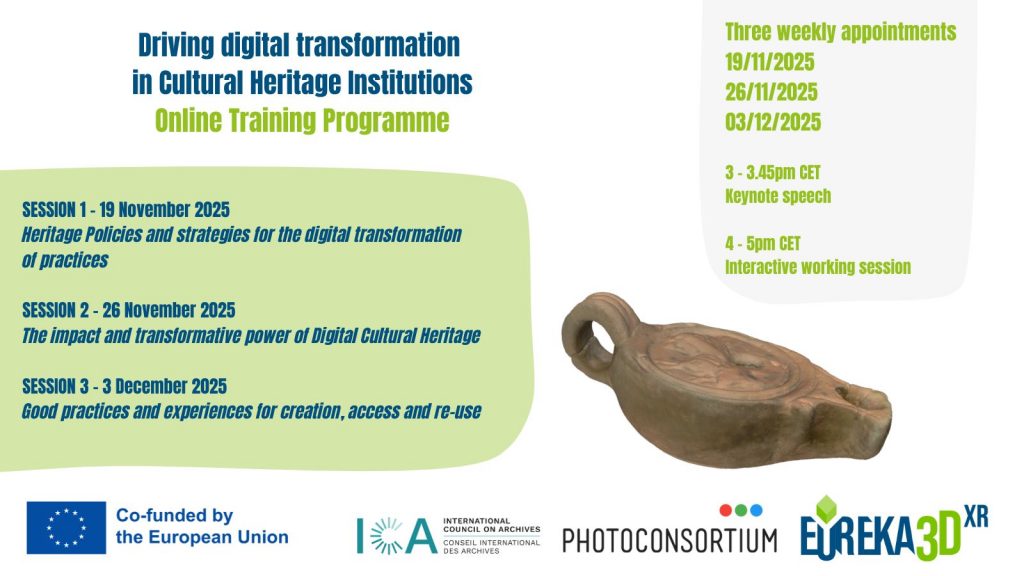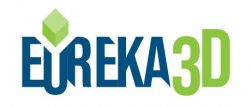An Online Training Programme
Wednesdays: 19/11, 26/11, 03/12/2025 at 3-5pm CET

After two series of webinars co-organized in 2023-2024 by EUreka3D consortium, Photoconsortium and ICA, the 2025 edition goes a step forward and offers an online training programme that provides knowledge and practical experiences to cultural heritage professionals. The programme includes 3 online sessions of 2 hours each. Each session is organised in two parts: a keynote speech from different domain experts, open to a wide group of participants, and an interactive working session offered to a selected group of learners who will have the opportunity to discuss, engage and share experiences, and will obtain a certificate of participation, based on their commitment to attend all three complete sessions, which include both the keynote lecture and the interactive working session.
The digital transformation of cultural institutions must be understood as a global phenomenon influenced by a wide range of factors. Throughout this online training programme, the digital transformation will be addressed from the point of view of heritage policies and strategies; the strategic approaches to digital cultural heritage; and the case studies as an approach to creation, access and re-use in cultural heritage.
To participate in the full training programme, applicants must complete the participation form by October 5. A total of 30 learners will be selected by the organisers, and will have the exclusive opportunity to discuss with highly renowned experts, exchange knowledge and experiences, and acquire practical tools and methodologies to improve their skills in the digital transformation in the field of cultural heritage. 10 learners’ places out of 30 are reserved to ICA members, and 20 are open to the rest of the audience. The interactive working sessions will be led by Prof. Dr. Peter Fornaro, Head of Research Projects at the Digital Humanities Lab, University of Basel. For further details and to apply, please check the full call for participation and fill in your application.
In addition, it is possible to attend the keynote speeches independently, via YouTube streaming. These are designed for a broad audience, including cultural heritage professionals, archivists, records managers, students, and educators in related fields. These streamed open-access lectures provide insights into the opportunities, challenges, and practical applications of emerging technologies in the cultural heritage sector.
Key dates:
Call for participation to the full training programme: open until 5 October 2025
Confirmation to selected learners for the full training programme: 17 October 2025
Structure of sessions:
- 3 – 3.45pm: open keynote speech
- 4 – 5pm: interactive working session.
FULL PROGRAMME
Wednesday 19 November 2025
Heritage Policies and strategies for the digital transformation of practices (streaming on YouTube)
Keynote speech by Antonella Fresa (Photoconsortium)
Interactive working session: discussion on policies, methodology for impact assessment, strategies of participating cultural institutions, participation in European and international programmes.
Wednesday 26 November 2025
The impact and transformative power of Digital Cultural Heritage (streaming on YouTube)
Keynote speech by Fred Truyen (KU Leuven) and David Iglésias (CRDI – Ajuntament de Girona)
Interactive working session: open discussion on learners’ experiences and challenges, calculation of economic impact, demonstrations on the transformative power of culture.
Wednesday 3 December 2025
Good practices and experiences for creation, access and re-use (streaming on YouTube)
Keynote speech by Frederik Temmermans (VUB – imec) and Eirini Kaldeli (National Technical University of Athens)
Interactive working session: co-creation exercise based on use case scenarios
The three interactive working sessions will be facilitated by Prof. Dr. Peter Fornaro (Head Research Projects at the Digital Humanities Lab – University of Basel).
ABSTRACTS AND SPEAKERS BIOGRAPHIES
Wednesday 19 November 2025
Heritage Policies and strategies for the digital transformation of practices
Abstract
Digital transformation implies several complementary actions that the cultural heritage institutions are demanded to cope with.
Digitisation of cultural heritage is just the beginning of a longer process that is expected to land the cultural heritage sector in a new dimension made of shared data, adoption of new standards, understanding of the technological challenges, awareness of the the social implications, engagement of human resources, financial investments and much more.
In this endeavour, the knowledge of the landscape of European policies and strategic visions is very relevant to orientate the efforts of the public and private sectors.
The main programmes, recommendations, reports and action plans published by the institutions of the European Union will be illustrated in the keynote speech delivered in the webinar.
The topics of Horizon Europe and Digital Europe programmes will be presented with a focus on cultural contents, namely the pillar 2 of Horizon Europe, the development of the collaborative cultural cloud for cultural heritage (ECCCH) and the common European data space for cultural heritage.
The Recommendation of the European Commission to the Member States of November 2021 will also be considered with regard to the whole dimension of the production and management of 3D cultural contents.
Also the research infrastructures for cultural heritage, specifically DARIAH and ERHIS, will be considered as part of the whole scenario of policies and strategies for the digital transformation of cultural heritage.
About the speaker
Antonella Fresa is an ICT expert, Vice President of Photoconsortium and Director of Implementations at Promoter Srl. She has been working on European cooperation projects since 1994 as Technical Coordinator and Communication Manager in the domains of digitisation of cultural heritage, access and creative re-use of digital content, long-term digital preservation, smart cities, citizen science, cultural tourism, eInfrastructures and cloud technologies. From 2002 to 2012, she was advisor of the Italian Ministry of Cultural Heritage and Activities and from 1999 to 2002, Project Officer at the European Commission. She regularly serves as an independent expert for the European Commission and national and regional research programmes. Since 2022 she is contracted professor at the University of Pisa.
Presentation by Antonella Fresa
Wednesday 26 November 2025
The impact and transformative power of Digital Cultural Heritage
Abstract
In this keynote, we will address how digitisation efforts, metadata enrichment and AI solutions have a transformative impact on the mission, organisation and working of heritage institutions such as Libraries, Archives and Museums. Looking back at a long series of digital projects, we will develop a foresight attempt in what lies ahead and how institutions can prepare for this profound digital turn, without losing sight on their core mission and societal role and taking into account the importance of civic engagement.
The presentation will be based on case studies focused on innovation in the heritage sector. The analysis of these pilots will, on the one hand, provide concrete results related to the application of technology and, on the other, allow us to understand the evolution of the heritage sector and anticipate professional trends in the coming years.
Presentation by Frederik Truyen
Presentation by David Iglésias
About the speakers
Frederik Truyen is full professor at the Faculty of Arts, KU Leuven. He publishes on digitalization, photographic heritage and e-learning. He is in charge of the multidisciplinary innovation centre DigitGLAM, which focuses on Digital Transformation in the Library, Archive and Museum sector. He is experienced in data modelling and metadata development for image databases in the cultural-historical field. He is co-founder and former president of Photoconsortium. Prof. Truyen teaches courses on digitisation and data for heritage institutions in the MA degrees of Cultural Studies and Digital Humanities. He is a member of Clariah-VL.
David Iglésias Franch is the Head of Department of Photography and Audiovisual Records at Girona City Council. He is Director and teacher of the Postgraduate Diploma in Management, Preservation and Dissemination of Photographic Archives, at the Higher School of Archives and Records Management (Universitat Autònoma de Barcelona). He is former Chair of the Expert Group in Photographic and Audiovisual Archives of the International Council on archives (ICA), 2016-2025. He is the President of Photoconsortium Association.
Wednesday 3 December 2025
Good practices and experiences for creation, access and re-use
Abstract
Ensuring that digitized cultural heritage assets can be created, accessed, and reused in trustworthy and sustainable ways requires both sound underlying principles and standards as well as practical solutions. In this session, Frederik will discuss good practices and current state of media standards for authenticity, provenance and representation formats that enable reliable long-term access. Particular attention will be given to how such frameworks can safeguard trust and reusability when cultural heritage data is enhanced or transformed, including through the use of emerging technologies such as AI. In the second part, Eirini will build on this perspective by presenting insights from the AI4Culture project. She will explore the opportunities and challenges that AI technologies bring to the cultural heritage sector, drawing on lessons learned from the project. As part of her presentation, she will discuss diverse as well as common concerns across different AI application scenarios and highlight the types of knowledge and capacity resources needed by CH organisations. She will also present the resources and functionalities offered by the AI4Culture platform, an online capacity-building hub designed to make AI technologies more accessible and usable within the cultural heritage sector. The presentation will be followed by a hands-on interactive session, where participants will have the opportunity to engage directly with the AI4Culture platform and provide feedback and suggestions for further improvements.
Presentation by Frederik Temmermans
Presentation by Eirini Kaldeli
About the speakers
Frederik Temmermans is guest professor in multimedia at the Department of Electronics and Informatics (ETRO), associated with the Vrije Universiteit Brussel and imec. His research focuses on media privacy, security, authenticity, and integrity. He has been involved in various research projects in the medical, mobile, and cultural domains. Frederik is an active member of the JPEG standardization committee (ISO/IEC JTC1/SC29/WG1) where he currently chairs the JPEG Systems and Integration subgroup and leads the JPEG Trust (ISO/IEC 21617) standardization activities. Frederik is also co-founder of the VUB spin-off company Universum Digitalis and member of the Photoconsortium Steering Committee.
Eirini Kaldeli is a senior researcher at the Artificial Intelligence and Learning Systems Laboratory of the National Technical University of Athens. She is also co-founder of the university’s spinoff Datoptron. Her most recent work focuses on the design of techniques and tools that make use of state-of-the-art digital technologies for data management, information retrieval, and crowdsourcing in the field of cultural heritage and beyond. She holds a PhD from the University of Groningen and an MSc in AI from the University of Edinburgh. She is the coordinator of the AI4Culture project and has led several projects in the intersection of IT and cultural heritage, including the CultureLabs Horizon RIA project and the CEF projects EuropeanaTranslate and Crafted.
Moderator and facilitator of the interactive sessions: Peter Fornaro
Peter Fornaro is Head Research Projects at the Digital Humanities Lab. With his scientific background in electrical engineering and physics, he worked, among others, for NASA. Thanks to his many years of experience in humanities research, Fornaro masters the conception and implementation of interdisciplinary research projects from scratch. As a trained scientific photographer, he experienced the change of the photographic image from the analogue to the digital domain in detail. This vast range of experience not only allows him to develop new, innovative solutions but also allows him to conduct a profound transdisciplinary dialogue. With a doctorate in experimental physics, he was habilitated at the University of Basel’s humanities faculty. In his research, Fornaro focuses on visual media and the linking of digital infrastructures with digital curation and collection management. This connection is key to making our cultural memory available for research and contributing to the successful digital transformation of our society, in which tradition and heritage go hand in hand with technology and innovation.

